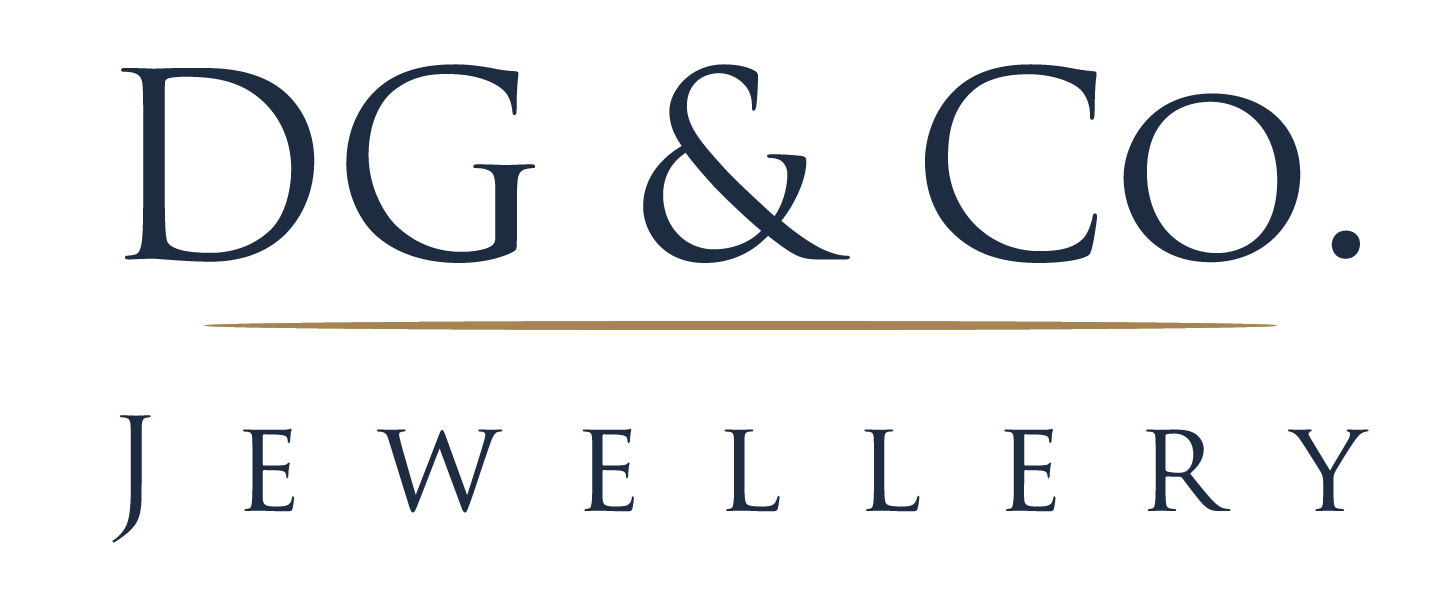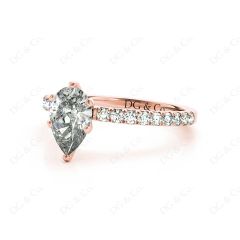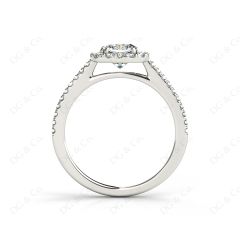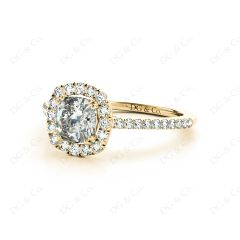Pavé Engagement Rings
What is a Pavé Engagement Ring?
Pavé engagement rings are rings featuring pavé side stones set onto the band of the engagement ring. Pavé set side stones are smaller gemstones set into a band typically held in place by prongs or beads, giving the appearance of stones closely paved together. Pavé is the most popular option of side stones, having been created in the Georgian Era.
Read More
What are the types of Pavé settings for engagement rings?
There are 6 different types of pavé settings available for side stone options:
- Traditional Pavé - Traditional Pavé refers to pavé set side stones set into the band of the ring, with 4 prongs securing them in place. Traditional Pavé is the most common type of pavé used in engagement rings.
- Micro Pavé - Micro pavé refers to the use of very small stones set next to each other, held together by even smaller metal beads. Micro pavé engagement rings feature the appearance of the band being covered in diamonds, and minimizes the appearance of metal. Micro Pavé comes in multiple rows and columns due to the smaller stones used.
- French Pavé - French pavé features pavé set side stones with a v-shape carved into the metal on the side of the side stones. Also known as fish tail pavé, French pavé allows for more light to enter your side stones as a result of the way the metal is carved. This allows for greater brilliance and scintillation from the side stones.
- U-Cut Pavé - U-Cut Pavé references pavé set side stones with U cut grooves carved into the metal on the side of the side stones. The U grooves also add sparkle and brilliance to your side stones as a result of excess light coming through the grooves.
- Petite Pavé - Petite Pavé refers to smaller beads used to set regular sized pavé side stones. This style is similar to micro pavé in the usage of the beads but petite pavé uses larger side stones, and less of them on the band of the ring. This minimizes the amount of metal on show on your side stones, allowing for enhanced brilliance and scintillation within your stone.
- Bright Cut Pavé - Bright Cut Pavé refers to shared beads/prongs, holding in place pavé side stones with the metal of the band also providing support for them. Bright Cut Pavé is also sometimes called channel pavé, this is because of the way the metal of the shank helps secure the side stones with the beads as well. This type of pavé setting is the most secure setting.
What to consider when buying a Pavé side stone engagement ring?
When buying a Pavé engagement ring you should consider many different things. Below are some key points:
- Pavé Side Stone Type
- Gemstone
- Metal
- Settings
Pavé Side Stone Type
When buying a pavé engagement ring, the type of pavé is the most important consideration. You have 6 types of pavé settings as options for your side stones. The different types of pavé are traditional pavé, micro pavé, French pavé, U-cut pavé, petite pavé, and bright cut pavé. Each of these types of pavé have different designs, the best one will come down to your preference and how it combines with the other elements of your ring (center stone, setting, and metal).
-
Gemstone
When buying a pavé engagement ring, the gemstones and/or diamonds are one of the most important considerations for your pavé style. What sort of gemstone you choose for your pavé style is important, whether you want a diamond, sapphire, ruby, or other gemstones. After choosing a stone, it’s important to look at the 4 C’s: Cut, Color, Clarity, and Carat weight. The sizes of the diamonds and/or gemstones, whether it’s 0.5 carat, 0.75 carat, 1 carat, 1.5 carat, or 2 carat pavé engagement ring, will affect the design. Your budget is the key to helping make a decision for center stone size and quality. Another consideration is the shapes of your center stones. Round, oval, princess, Asscher, emerald, and pear cut center stones are popular options for the pavé style.
-
Setting
There are 3 main setting options for pavé engagement rings: prong, bezel, and tension settings. Prong settings are the most popular setting for pavé engagement rings, with 4, 6, and 8 prong variations being the most common. Tension settings are another option when choosing a setting for pavé, and are very unique, but only certain shapes can be set in a tension setting. Bezel settings also come in full bezel and half bezel alternatives. Bezel options are the safest option and are a great choice for those who are clumsy and prone to damaging their ring. The perfect setting for a pavé engagement ring comes down to your preference, and weighing up the benefits of the different settings.
Metal
Platinum and gold are the two main metal choices for those interested in a pavé engagement ring. Platinum has its beautiful silver color and is a very durable option for a pavé engagement ring. Gold comes in 9k, 14k, and 18k gold for engagement rings, along with white, yellow, and rose gold colours for pavé engagement rings. Consider the metal type you like along with the different colours, and the durability of the metal or its karat when choosing a metal for your pavé engagement ring.
Why should I buy a Pavé engagement ring?
Buying a pavé engagement ring comes with added shine, thanks to the extra stones contributing sparkle and brilliance. They also enhance the center stone, creating a center stone with a lot of brilliance and scintillation. Pavé's provide customisation options, allowing for a unique and personalised design. However, there are drawbacks to consider. Pavé engagement rings are generally more expensive than solitaire rings due to the additional stones and intricate settings. The increased shine might be too flashy for some, and the overall design can become more complex, potentially not appealing to those who prefer a simpler style.
What are the pros of buying a Pavé engagement ring?
- Adds more shine: Pavé brings extra sparkle to the ring, making it more visually appealing and catching the eye with the increased brilliance. This added shine and brilliance makes pavé's a popular option for those who like the extra sparkle of diamonds for their engagement ring.
- Enhances center stone: The placement of pavé on the band of the ring doesn't just add visual appeal; it also works to enhance the beauty of the center stone. The brilliance of the smaller pavé side stones shines and reflects onto the center stone of the engagement ring, enhancing the center stone's brilliance, and provides the appearance of a larger diamond.
- Customisation of Pavé: One of the key advantages of pavé rings lies in the customisation options. You can personalise your pavé by choosing the type, size, and arrangement of the pavé stones, allowing you to craft an engagement ring uniquely yours. This customisation ensures that your engagement ring is a true reflection of your personal style and preferences.
What are the cons of buying a Pavé engagement ring?
- More expensive than solitaires: While pavé engagement rings can be very appealing, the inclusion of extra stones and intricate settings often translates to a higher cost compared to rings without pavé side stones. This increased expense can be a drawback for those with budget constraints.
- Pavé can be too shiny: The additional sparkle from pavé, although a pro for many, can be a con for those who prefer a simple or understated design. The addition of the pavé may be perceived as too flashy.
- Requires more maintenance: The additional stones and detailed settings create more surfaces for dirt accumulation. This results in more cleaning required as dirt accumulates quicker on the pavé setting.
How much does a Pavé engagement ring cost?
A pavé engagement ring at DG & Co. Jewellery costs between $1,195 - $5,085 for the style alone. When choosing a diamond or gemstone center stone, this can really bring up the cost, especially when going for a large high-quality diamond or precious gemstone. The average pavé engagement ring with a center stone is around $8,000 - $10,000.
What are the most popular Pavé engagement rings?
The best pavé engagement rings will ultimately be dependent on each person's preferences, but our most popular designs are below:
- Brilliant Round Cut 6 Claw Diamond Engagement Ring Pave Setting Side Stone In 18K White Gold
- Round Cut Diamond Ring with Micro Pave Set Diamonds on Halo and Down the Shoulders in 18K White
- Two Tone Oval Cut Diamond Engagement Ring Pave Setting Side stone In 18K White And Yellow Gold
- Trilogy Halo Diamond Engagement Ring Pave Setting /a>
- High Setting Diamond Engagement Ring with Pave Setting Side Stones
- Round Cut Classic Solitaire Four Claw Diamond Engagement Ring with Micro Pavé Set Prongs in Platinum
- Emerald Engagement Ring Emerald Cut with Pavé Set Diamond Side Stones in 18k White Gold
- Cushion Cut Two Tone Diamond Halo Engagement Ring with Pavé Side Stones in 18k White and Rose Gold
Free Shipping
Lifetime
Guarantee
Complementary
Valuation
Conflict Free
Diamonds

30 Day Money Back
Guarantee
DG & Co. Guarantees
Free Shipping
Lifetime
Guarantee
Complementary
Valuation
Conflict Free
Diamonds

30 Day Money Back
Guarantee
Contact Us









































































